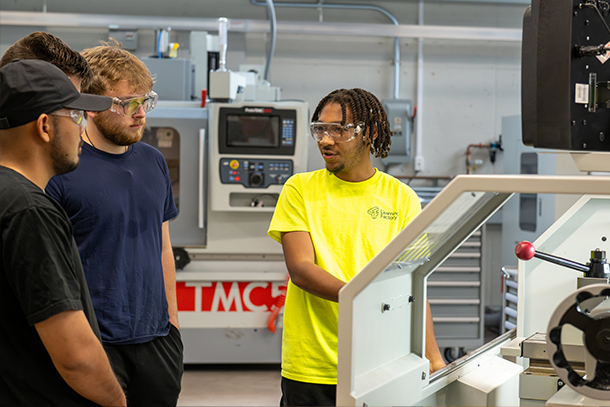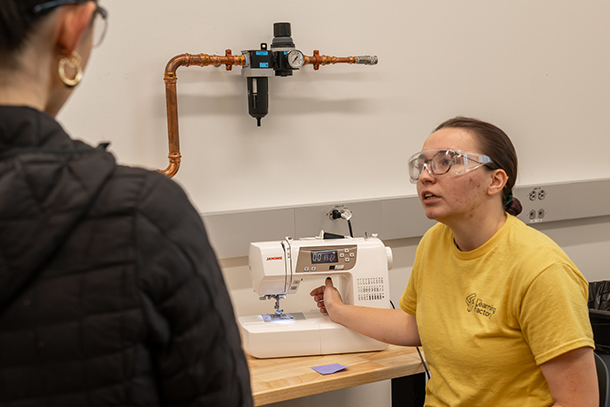
Yanni Cajuste trains on the lathe in the metal shop while other students observe. Credit: Kate Myers/Penn State
Learning Factory equips students with lifelong skills
November 10, 2023
By Danica Laub
UNIVERSITY PARK, PA — Textbooks and lectures are necessary for all undergraduate and graduate academic programs, but for countless engineering students studying at Penn State University Park, the practical hands-on experience they gain through industry-sponsored, client-based projects within the walls of the Learning Factory is critical to their success.
Students have access to an array of facilities and equipment at the Learning Factory including a full woodshop, metal shop, additive manufacturing lab, electronics and Internet of Things lab, composites lab and open maker spaces.
Steven White Jr., engineering support specialist with the Learning Factory; Melina Trautman, fourth-year mechanical engineering student and Becca Baker, fourth-year industrial engineering student, discuss how the Learning Factory’s safety and skills training programs set students up for success during their time on campus and throughout their future careers. Trautman and Baker are Learning Factory teaching assistants (TA).
Q: How does the Learning Factory training process work?
White: Students start by taking the initial online safety training, which includes an online video quiz and an in-person scavenger hunt, granting them access to the fourth-floor maker space. From there students can enroll in a wide variety of shop-specific trainings including additive manufacturing, woodshop, metal shop and textiles. We are constantly improving our training offerings and bringing new opportunities to students as they become available.
Q: What’s the difference between safety training and skills training? Why are both important?
White: Safety training is expressly concerned with how to be safe while using the equipment. Skills training is expressly concerned with how to use the equipment efficiently. Both trainings are important because they assist students in using the equipment correctly and safely.
Q: Why is an online quiz used instead of an in-person quiz prior to the onsite training?
White: The online quiz is used instead of an in-person option as a solution to throughput issues. We were getting requests for training that we did not have the staff or opening hours to fulfill. We had to implement a new training procedure to account for the number of people we wanted to get trained.
Q: Who should take the trainings?
White: I think everyone should take the trainings. We are an open maker space for the entirety of the University. Anyone could come into the space and use the equipment.
Q: What types of projects do students and faculty work on at the Learning Factory?
White: The Learning Factory sees a wide range of projects from introductory-level engineering courses to upper-division design-build projects. We are also an open maker space so we can see all sorts of projects from across the college and University. Some highlights include a full-scale metal lightsaber and two guitars.
Q: Why is it important for TAs to be involved in the training process for other students, and how does it benefit both the TA and the student learning?
White: We have found that students learn better from student TAs. It helps students engage with the training when they can relate to the person giving the training. TAs are a vital part of the Learning Factory ecosystem. They monitor spaces across five floors of the Engineering Design and Innovation (EDI) Building. The TAs act as the front line for questions that students have. This allows the students using the space to be able to get help with projects quickly and efficiently because we always have TAs on duty during our normal operating hours. The TAs also benefit from hands-on skill application with machinery and technology. Through their work at the Learning Factory, TAs grow in different ways such as leadership, management, and safety coordination.
Q: What is your role in the training process?
Baker: I help with administering two types of trainings, Fab Lab North (Textiles) and Metal Shop—Basic. I guide students through the equipment in these spaces and go over the safety concerns and rules with them. I try to make the trainings as interactive as possible by doing demonstrations of the equipment. Additionally, I run the Bookings Page where all students sign up for advanced trainings. When we need to adjust a schedule or we're putting out a new training, I am the one who makes that public via the Bookings Page.
Q: Why did you want to be a Learning Factory TA?
Baker: I wanted to be a Learning Factory TA because I am very passionate about machining and manufacturing, and I want to help other students realize their passion for it too. Making a design come to life is something that drives me to be a successful engineer. Having the capacity not only to work with the equipment in the Learning Factory, but to also help other students do the same is very fulfilling to me. In the new EDI Building, we have a lot of great equipment with loads of potential for creativity and ideation.
Q: How does your involvement in the trainings make you a better TA?
Trautman: I know the equipment much better than I would if I weren’t teaching other students how to use it. No student is the same, so if they ask you a question you don’t know, it’s a good opportunity to grow in your own knowledge.
Q: Why do you think it’s important for students to learn from and work with fellow students like yourself?
Trautman: Learning how to be collaborative and knowing when to ask for help is a skill not only important to the engineering world but to any professional career. A lot of TAs have an immense amount of knowledge that we’re eager to share, you just need to ask.
Q: How has your experience with the Learning Factory benefited you as a student, and a future engineer?
Baker: Not only has my Learning Factory experience given me the skillset to work on personal or school projects, but it has also given me the confidence to work on a problem knowing that I have resources to help me. I've learned so much in my time working at the Learning Factory, and I've also made great connections with my coworkers that will span outside of Happy Valley.
Q: Is there something at the Learning Factory for every engineering student or do students in certain majors benefit more than others?
White: Every engineering student can benefit from the resources available at the Learning Factory. We focus on making everyone feel included and a part of the Learning Factory community. This means that all students who visit the Learning Factory should feel both physically and mentally safe.
Q: On average, how many students participate in the safety and skills training each semester/year?
White: The Learning Factory trains 2,000 to 3,000 students per year.
Q: How are new trainings incorporated when new equipment is added?
White: This depends on the safety factor of the equipment. If it is deemed as a high-risk piece of equipment, a new mandatory training will be required. If it is deemed as a low-risk piece of equipment (with no new hazards compared to the rest of the equipment) we have trained student staff members to assist with operations. They would be tasked with assisting students on how to use this new piece of equipment.
Q: How does the training and use of the equipment at the Learning Factory help skill and upskill students for their future engineering careers?
White: The Learning Factory provides engineering students with opportunities to get hands-on experience with equipment they may see once they go into industry. As someone coming from industry, I feel that understanding how to make physical items is crucial for engineering. It allows students to better communicate with skilled craftspeople, making the process of design to final product easier. There is also a level of design for manufacturability that can be learned through the hands-on use of equipment. I strongly feel that the Learning Factory gives the opportunity to students to get more involved in the manufacturing side of engineering and that makes our engineering program stronger.

Becca Baker conducts textile training in the Learning Factory's fourth floor maker space. Credit: Kate Myers/Penn State



